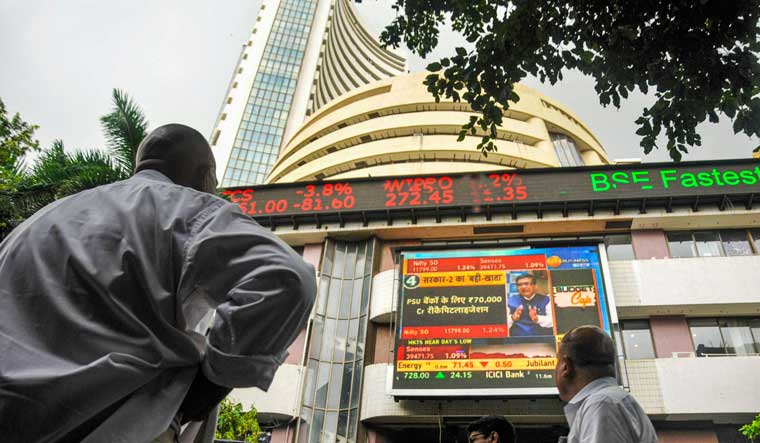Bears took charge of equity markets for the second consecutive session, with the benchmark indices crashing more than 2 per cent as investors were disappointed with some proposals in the Budget. A sell-off across Asian equity markets also weighed.
The BSE Sensex plunged 793 points or 2.01 per cent to end the session at 38,720.57. The wider NSE Nifty50 index tumbled 253 points or 2.1 per cent to close at 11,558.60. Broader markets had declined 1 per cent on Friday, the day of the budget.
“Equity markets were expecting some kind of fiscal stimulus from the budget, but there has been big disappointment,” said Rusmik Oza, head of research at Kotak Securities.
A proposal in the budget to impose tax on share buybacks by companies, too, hasn’t gone down well among market participants. There is also worry over another budget proposal of increasing the minimum public shareholding in listed companies to 35 per cent from 25 per cent. Its a move that could lead to a flood of equity offers in the market as almost a quarter of all the listed companies will have to pare promoter stakes.
There was carnage across most sectors, with 27 out of 30 Sensex stocks closing in the red. Auto stocks continued to slip, with Mahindra & Mahindra, Hero MotoCorp, Maruti Suzuki, Tata Motors and Bajaj Auto all falling between 1 per cent and 5.5 per cent. Other consumer-oriented stocks like Hindustan Unilever, ITC, Bharti Airtel and Asian Paints also closed 1-2 per cent lower.
“A Rs 2 per litre hike will immediately make ownership of two and four wheelers more expensive. Expectations of a boost to consumer spending have not materialised, with the government preferring to focus on infrastructure investments and this is likely to delay consumer spending recovery,” said Sunil Sharma, chief investment officer at Sanctum Wealth Management.
Among the state-run lenders, Punjab National Bank (PNB) slumped 11 per cent after it reported a fraud of Rs 3,800 crore by Bhushan Power and Steel. Bhushan Power is among the 25 large NPA (non-performing assets) accounts and is currently in advanced stages of resolution at the National Company Law Tribunal.
PNB said it had been observed that the company had misappropriated bank funds and manipulated books of accounts to raise funds from consortium lender banks.
Shares of other state-run banks were also under selling pressure on Monday. State Bank of India, Bank of India, Union Bank and Canara Bank fell between 4 per cent and 10 per cent.
Finance Minister Nirmala Sitharaman had in her maiden budget on Friday proposed a plan to recapitalise public sector banks to the tune of Rs 70,000 crore. While this funding is expected to help the lenders boost credit to the economy, Oza said it would be equity dilutive if done below book value.
Larsen & Toubro, NTPC, ONGC and Bajaj Finance were among other big losers, whose stocks fell 4 per cent to 8 per cent.
Asian markets were also weak; Japan’s Nikkei Stock Average 225 tumbled 1 per cent, Hong Kong’s Hang Seng was down 1.5 per cent and Korea’s Kospi index declined over 2 per cent as strong jobs data in the US lowered expectations of US Federal Reserve cutting interest rates.
Back home, beyond the budget, all eyes of investors will now also be on corporate earnings season, which kicks off with technology bellwether Tata Consultancy Services announcing results for the April-June quarter on Tuesday. Analysts say there is little to cheer about as far as corporate earnings performance goes this time, with consumer-focused companies expected to report weaker sales growth.
“The bigger worry for markets is the forthcoming earnings season. Based on our in-house Q1-FY2020 preview, earnings of Nifty-50 are expected to grow by just 1.3 per cent on a year-on-year basis,” said Oza.
If banking sector were to be excluded, earnings are actually likely to decline by nearly 7 per cent. A disappointing set of results could lead to brokerages cutting full year earnings expectations sharply.
Sharma also expects companies to report weak earnings in the first quarter.
“Animal spirits could be weak in the short-term, and with a weak monsoon, shorter term stresses could arise. A key to arresting the slide will be whether transmission occurs on lower (interest) rates meaningfully,” he said.
Despite their high valuations, Sharma says, the preference remains on large-cap stocks and Sanctum Wealth will continue to deploy fresh money to large-caps.



